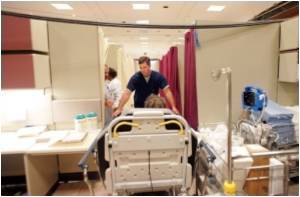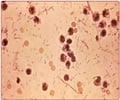An outbreak strain of Clostridium difficile, a bacterium that causes diarrhea and sometimes life-threatening inflammation of the colon, is common in Chicago-area

Of 129 C. difficile isolates cultured from these patients, 61 percent were the outbreak C. difficile strain known as BI/NAP1. The BI strain, which is known to cause more serious illness, is usually associated with large acute outbreaks of C. difficile.
However this investigation suggests that BI is endemic in the Chicago area and patients could be at risk for severe disease even in the absence of a large acute outbreak. "Our findings highlight the need for effective interventions aimed at reducing the risk of C. difficile infection," said Stephanie Black, MD with the Chicago Department of Public Health and the investigation's lead author.
The investigation suggests that the transfer of patients from one facility to another has helped to spread the BI strain. Dr. Black and her team found that half of the patients with the BI strain were transferred from one healthcare facility to another.
"Inter-facility transfer of recently infected patients is a plausible mechanism for the spread of the BI group and may explain in part how BI became the dominant [strain] in this region," the authors write.
C. difficile is most common in elderly patients and those receiving treatment with antibiotics. It is considered to be one of the most important health care-related infections in the U.S.
Advertisement
- Make sure that all doctors, nurses, and other healthcare providers clean their hands with soap and water.
- Only take antibiotics as prescribed by your doctor.
- Be sure to clean your own hands often, especially after using the bathroom and before eating.
Source-Eurekalert










